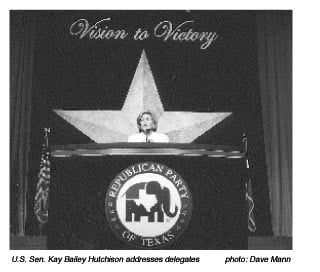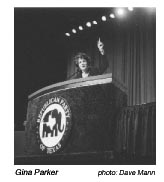In Search of the Next Crusade
Republicans discover it's easier to be an up-and-comer
If any overarching theme connected all the various subplots and intrigues at the recent Republican state convention in San Antonio, it was this: it’s easier to be an up-and-comer. For 16 years—ever since Pat Robertson ignited the Evangelical GOP grassroots in Texas with his bid for the Republican presidential nomination in 1988—the movement has been on a holy quest for power. And finally, in 2002, total victory arrived. Republicans seized control of government at all levels: every statewide office, majorities in both chambers in the statehouse and the U.S. Congress, as well as a Texas Republican in the White House. However, with President Bush’s 2004 victory in Texas assured and contested November races scattered randomly throughout the state, the crusaders didn’t have a unifying electoral challenge coming into the convention. In the absence of one, divisions, contradictions and personal ambitions came to the fore, a trend that is likely to intensify in the future.

In some ways, the special legislative session on school finance prefigured some of these developments. The governor had called lawmakers to Austin to act on his school finance proposal, even if doing so threatened their political prospects. But it’s easier to call for goodies like property tax reductions on the campaign trail, when you’re not the one who must decide how to pay for them. Instead of playing follow-the-leader, the more activist-minded House soundly rejected Perry’s plan, and the session fizzled out to the sound of factional bickering. (As a spokesman for U.S. House Speaker Dennis Hastert (R-Illinois) lamely noted recently, “It’s extremely difficult to govern when you control all three branches of government.â€)
Signs of the struggles in San Antonio were as near as the competing tchotchkes worn by delegates: Rick Perry necklace pouches, Carol Keeton Strayhorn “One Tough Grandma†Texas-shaped pins, or red bags with U.S. Sen. Kay Bailey Hutchison’s name emblazoned in big letters. The 2006 election prospects of these three leaders proved to be the proverbial elephant in the convention room. Both Strayhorn and Hutchison are frequently mentioned as challengers to Gov. Rick Perry, who is hoping that a 2006 win will make him the longest-serving governor in Texas history. The comptroller and the senator are still coy about their future plans, but that didn’t stop friend and foe alike from discussing the various scenarios. At a reception on the convention’s first day, Strayhorn left supporters with little doubt about her intentions. Delegates crammed into her hospitality suite on the Marriott’s 34th floor, munching tamales and taking advantage of the well-stocked bar. Abruptly, someone shushed the crowd and asked the comptroller what attributes made for a good governor. The compact politician, obscured from view for most of the crowd, began rattling off her answer in a raspy, disembodied voice. “What makes for a good governor?†she asked rhetorically after hitting a few boilerplate campaign points. “She has to love Texas.â€
The use of the female pronoun wasn’t lost on the delegates. Amid the applause, a woman yelled, “When you’re ready, your troops are behind you,†and the crowd roared their assent.

The next day, convention organizers showed the grandma where she stood in the state GOP pecking order. Strayhorn was given a late Friday slot to address the delegates, after they had voted on the rules and platform and following Land Commissioner Jerry Patterson and Railroad Commissioner Victor Carrillo. By the time the comptroller got on stage, the convention hall was half empty. Even then, Strayhorn was not without her critics. While she spoke, delegates from Jefferson County taped homemade signs to their chairs, such as “one liberal grandma,†“grandma is at the wrong convention,†and “beware of a wolf in grandma’s clothing.â€
Texas is so solidly Republican that conventional wisdom holds that whoever survives the GOP primary will ultimately gain statewide office in 2006. Perry seemed to understand how important it was to win the grassroots assembled in San Antonio. On the first day of the convention, the governor was seemingly everywhere, giving a speech at each stop—from an opening address before all the delegates in the afternoon to a rambling talk that night at the Texas Eagle Forum banquet. An informal poll later that evening taken in the hotel bar among a few members of the heckling class awarded the governor his highest marks for an address before the African-American Summit.
At the summit, Perry seemed relaxed and genuinely pleased to take credit for appointing the first African-American Texas Supreme Court justice. All told, the GOP has supported the successful bid of three African-American statewide candidates, which is more than Democrats have done. Both GOP African-American Supreme Court justices, Wallace Jefferson and Dale Wainwright, attended the summit, as did Railroad Commissioner Michael Williams. It was a far cry from the Dallas convention in 2002, when organizers abruptly canceled both a media gathering to meet minority delegates and a “Diversity Conference.†This time the party clearly invested the money and brought out the people in San Antonio—translating that into votes is another matter, though. Still, the few dozen African-Americans at the convention stood out, as they tended to travel in groups. It was difficult to gauge how many Latinos participated, although a handful did mix with a majority of Anglos at the National Hispanic Republican Assembly reception.
Despite Perry’s performance at the summit, he knows that his future in the primary really depends on the energy of the Anglo Christian grassroots. In his speech before all the delegates, he doled out plenty of red meat to them, mentioning his role in congressional redistricting, blasting “activist judges,†and proclaiming himself “an optimistic conservative who is pro-jobs, pro-growth, pro-family, and pro-life.†But if Perry didn’t know it going into the convention, the governor learned that many party activists are not altogether happy with his role in the seemingly endless 78th Legislature that he keeps calling back into session. And they chose the party platform as the forum to show their displeasure.
The Texas GOP party platform embodies all the hopes and dreams of the grassroots. They attach such importance to the platform that delegates are happy to debate it late into the evening. The final product is a fascinating document that describes a twilight world beset by horrible dangers like illegal immigration, the Internal Revenue Service, and the United Nations. It calls for the wholesale dismantling of the federal government and affirms that “the United States is a Christian nation†and that the Ten Commandments “are the basis of our basic freedoms and the cornerstone of our Western tradition.â€

The platform is so extreme, Democratic Party chair Charles Soechting said to reporters during the convention, that it could qualify as “the longest political suicide note in modern Texas history.â€
This year, the grassroots faithful passed a new plank in the platform urging the repeal of Perry’s transportation vision—the Trans-Texas Corridor—because it allows for eminent domain and is set up to reward commercial contractors. Surprisingly enough, the platform also recognized a growing revolt within the GOP grassroots against the school vouchers that Perry and some of his big campaign contributors want.
“There was more testimony on school choice in the four days of hearing testimony than any other topic,†Richard Russell, a platform committee member told the delegates in his senate district. The activists testified to their fears that if public funding in the form of vouchers finds its way into private schools, government regulation is sure to follow. “It’s time to reverse the idea that Republicans are for vouchers,†said one delegate. “Vouchers lead to more control.†The solution the platform framers found was a constitutional amendment to keep the government out of private schools that would be passed along with any voucher proposal.
But many delegates’ true ire at Perry came from the governor’s hugely unpopular plan to legalize gambling in Texas by allowing up to 40,000 video lottery terminals. In addition to its long-standing opposition to the lottery, the platform now reads: “We oppose any further legalization, government facilitation, or financial guarantees relating to any type of gambling, including casino, riverboat, video lottery terminals (VLTs), slot machines, video keno, eight-liners, multi-state lotteries and other games of chance.â€
When Senator Kay Bailey Hutchison spoke on Saturday, the final day of the convention, some of the loudest applause came when she said after a pause and a stern glare, “Governor Bush fought gambling in this state, and I will too.†The delegates erupted into a standing ovation. Sitting behind the senator on the stage, the convention chairperson, state Sen. Jane Nelson (R-Lewisville), who has threatened to filibuster the governor’s gambling proposal, looked downright giddy.
The hugely popular Hutchison is seen as the most serious challenger to Perry and the linchpin of the GOP shuffle in 2006. Some believe her destiny is tied to that of George W. Bush. Under this theory, if Bush wins another term, the Democrats put Hillary Clinton on the ticket in 2008, and the GOP counters with Hutchison, who stays put in the Senate until then. If Bush loses, Hutchison returns to Texas to run against Perry. In this scenario, Hutchison, by launching a gubernatorial bid, makes room in the Senate for a run by Lt. Gov. David Dewhurst. Strayhorn then goes for the spot vacated by Dewhurst.
Ultimately, it is unclear what role the GOP grassroots represented at the convention will have in all of this jockeying other than a final vote in the primary. Traditionally, activists have been unwilling to push too hard against their leaders. A revolt by the party’s grassroots activists against incumbent Texas Republican Party chair Tina Benkiser, seen as the establishment choice, failed at the convention. Oddly enough, the challenger, a candidate of the right-to-life crowd and many Christian fundamentalists, was Gina Parker, a trial lawyer. In one strain of the hard-right ideology that prevails in the Texas GOP, personal injury attorneys are regarded as the moral equivalent of Satan’s minions. In her speech, Parker argued that there really are “good conservative trial attorneys.†She termed the criticism of her “much ado about nothing,†but Texans for Lawsuit Reform, the influential, Houston-based group that lavished dollars on GOP candidates in 2002 and pushed Proposition 12’s broadside of the civil justice system last year, endorsed Benkiser, a defense attorney.
As in the special session that ended in May, the famed GOP unity appeared to be experiencing cracks in San Antonio, the natural result, in part, of winning everything. The conflict does not bode well for another special session on school finance that Perry might call in July. However, it does promise to make the 2006 election very interesting.


